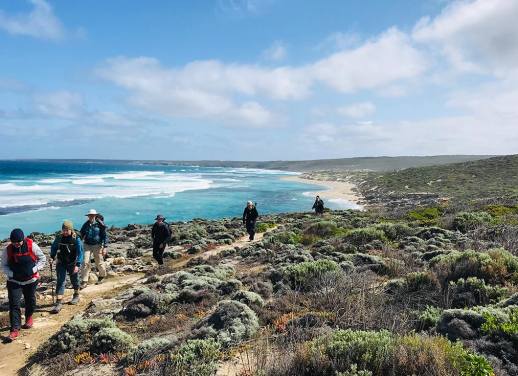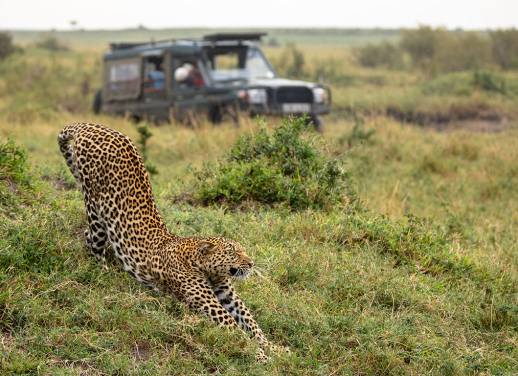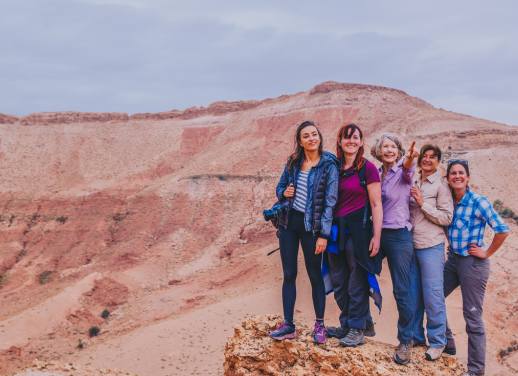It hasn’t always been easy for writer Mariam Amini to honour her faith while away. But having travelled from Macedonia to Malaysia as a Muslim, she’s learned tips along the way.
I first started praying daily in March 2020 at the onset of the global lockdown on an unpopulated island in Malaysia. The sole inhabitants were the locals running a permaculture project where I was volunteering.
Though the small island had no shops, no schools and no healthcare facilities, it did house a prayer room – a blessing I did not realise at the time.
My faith practice has grown steadily over the years, as has my awareness that Muslim travellers face unique challenges while on the road. In many parts of the world, where Muslim populations may not be sizeable, there are certain obstacles Muslim visitors like me must overcome.
However, having been lucky enough to travel to almost 50 countries, I’ve found there are always ways to work around the circumstances. By fostering a mindset of openness and adaptability on each trip, I’ve discovered that faith shouldn’t act as a foil to travel but a foundation to further deepen the experience.

Sourcing halal food
In the nine months I spent travelling around Central and South America, I rarely found restaurants serving halal food. In comparison, it was abundant in Muslim-majority countries like Malaysia, where I feasted on the national dish of nasi lemak, homemade-style beef rendang and creamy kari ayam (Malaysian chicken curry) with flaky roti canai flatbreads, safe in the knowledge that it adhered to my faith’s ethical and religious guidelines.
It’s always a pleasant surprise when I do find halal food unexpectedly, such as during a ten-day tour of the Baltics when, having arrived in Tallinn, Estonia, after a long bus ride from Latvia, I stumbled upon a Turkish restaurant right next to my hostel. I was fairly confident the meat would be halal, but it was still a relief when the staff member behind the counter confirmed it.
Since Islam considers most types of seafood as permissible without the need for zabiha (the ritual slaughter), I always recommend adopting a pescatarian diet in destinations where halal meat isn’t available. This has served me well in places like Lake Titicaca in Bolivia and the Galapagos islands, where the fish was always abundant, fresh and often the most affordable option.

Making wudu
Wudu, the pre-prayer ablution ritual in Islam, serves as an act of spiritual and physical purification. It involves conscientiously washing different parts of your body, such as your face, arms, ears and feet. Naturally, when travelling, both time and bathroom amenities become more limited. Long journeys are the most challenging, with coaches and planes simply not giving the space needed to perform wudu as thoroughly.
On such occasions, I make do with what there is, even if it means compromising on the quality of my wudu. For example, rather than taking off all footwear in that cramped and often dirty bus toilet, I simply wipe over the top of my shoes instead.
Fortunately, Islam encourages such flexibility. If there is no water for making wudu, then you can perform tayammum (dry ablution) using clean earth, sand or stone. I did this most recently on a walk through the UK’s Peak District, by carefully patting my hands on a large rock. The Quran has so many passages about the perfected beauty of our world, how ‘the Earth is a resting place, and the sky a canopy’. So, if anything, the act made me feel more connected to the sacredness of nature – as well as my Creator.
Read more: He converted to Islam so we could travel together


Fasting for Ramadan
I was in Skopje, North Macedonia, when I shared my first Ramadan together with my partner, Christian. He had only converted to Islam the previous year, so it was his very first time experiencing the holy month.
Honestly, fasting and travelling is a pretty exhausting combination. But we quickly learned to scale back our itinerary, preserving our energy for what we most wanted to see – which is perhaps a good lesson for all travellers, even beyond the Muslim faith.
By Ramadan 2023, we had found the right balance. We spent the month in Malta, working remotely during weekdays and exploring the island on weekends. For our first daytrip to Valletta, we broke fast at sunset with locals at one of the city’s mosques. My grandmother in Germany had also started chemotherapy at the time, so it was incredibly cathartic to sit beside a Muslim sister and have her offer me solace.
Normally, like praying, Islam exempts travellers from fasting – and I have made use of this leeway at times when I’ve needed to, such as during long travel days between destinations. But when you’re backpacking indefinitely or for long periods, it feels less justified to postpone the fasting completely.
My advice is to wait until you are more settled, even if it’s just a temporary base. Be wary in tropical climates where there is a higher risk of dehydration and try to stay inside during the hottest part of the day.

Finding a place to pray
As a Muslim, I am prescribed five daily prayers. Each has its own time window, in alignment with the sun’s position. During busy days exploring a new place, this salah (prayer) often grants me a moment of respite from all the stimulation. It also offers a form of structure for when you’re away from your usual routine, giving the day a welcome cadence. However, it can at times be tricky to find the right place to pray.
Technically, in Islam, you are allowed to postpone your salah when travelling. Alternatively, you can pray on the go. Even the Prophet Muhammad (peace be upon him) was known to pray from atop his camel during long journeys.
Unless I’m in a place where mosques are readily accessible, I usually settle on a quiet spot, wherever that may be. On that same Baltics’ trip, I was in the Lithuanian National Museum in Vilnius when it was time for midday prayers. I found a bench to sit on near the museum’s exit and prayed there. Later, I did the same inside one of the city’s many churches.
It can be unnerving knowing there are passersby while you are in such a vulnerable state and the lack of privacy is often distracting, so it’s about assessing your own level of safety and comfort. After all, postponing the salah and praying later is still a valid option.


Experiencing prejudice
I rarely wear a headscarf outside, so typically I am not visibly Muslim and this is one challenge I am fortunate to face less regularly. However, there have certainly been times when ignorance has led to unwarranted comments, such as another volunteer criticising the process by which halal meat is made on that same Malaysian island where I began praying.
Naturally, people have their own assumptions, but my benchmark for whether to engage is in how receptive the other person is to a measured and meaningful discussion. In Islam, we’re taught to view all of humanity as brothers and sisters, so it can act as an opportunity to engage with non-Muslim travellers. Like the time I ended up on a tour to the floating islands of Uros in Peru with a Palestinian and an Israeli. They were both from the city of Haifa and, to my surprise at the time, perfectly civil with each other. They even joked about the nightlife scene.
Later, on the boat ride back, I spoke very candidly with the Israeli, trying to understand more about his perspective and, to an extent, identify where my own prejudice lies. Sadly, such conversations won’t always be so well-mannered. But this particular instance was a chance to connect with a fellow traveller and I would encourage others to pursue such interactions too, when the time feels right.
Read more: On the road with Intrepid’s BIPOC mentorship scheme



Faith deepened by travel
By actively finding ways to honour my faith while travelling, despite having to make compromises and overcome challenges at times, I’ve felt my own resolve and self-efficacy strengthen over the years.
Like all travellers, I’ve definitely had times when things haven’t gone to plan. But my faith has taught me to practise gratitude for both good times and bad. As Muslims, we see the good as evidence of God’s abundant love and mercy, and the bad as a chance to grow in faith and patience.
By embedding my faith habits into my travel, I’ve cemented trust in myself, in other travellers and in the world around me, that things will be okay, even when they don’t go my way.
Join a diverse community of travellers on a small-group adventure with Intrepid.




